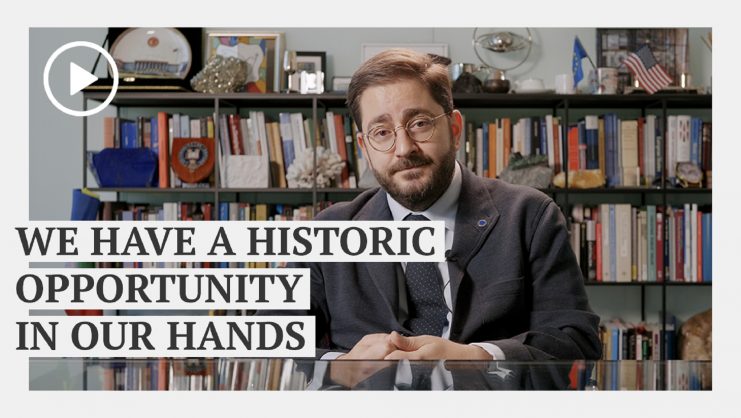Leading up to the COP26, the UN Climate Talks were labeled our “last best hope” to avoiding a total climate breakdown. While the UN secretary-general António Guterres has been calling for stronger multilateralism, Covid is an increasingly insistent reminder of our inability to cooperate as a global community in the face of transnational threats. Mountains of ink have been spilled (and endless platitudes in speeches) over why we must find ways to cooperate across national lines. So, then, why do we have such a hard time collaborating, especially when it is for a cause that is essential to all? There are three key pieces to this puzzle: the international, the national, and the personal.
Starting with the international, these institutions (for example, the UN) are both physically and democratically distant from citizens. The political scientist Robert Dahl wrote about this democratic dilemma in 1994 and placed international institutions within a historical framework of democratic transformations, starting with the transformation of non-democratic city-states into democracies in 5th century Greece. Granted, not everyone got to be a citizen in these early democracies, but for those who were eligible, citizenship meant very intense and active participation. The second transformation was from the city-state to the nation-state, the scale of which required that assembly democracy be replaced with representative democracy. This was a deeply radical notion and, in fact, some people still do not accept it as a form of democracy. Nonetheless, it is what those of us lucky enough to live in democracies know and expect today. Finally, we are currently going through a third transformation, one where transnational systems will reduce and constrain the role of nation-states, much as nation-states once reduced and constrained the role of city-states.
Representative democracy was necessary to achieve the large-scale effectiveness of nation-states yet, at the same time, it reduced direct citizen participation in their democracies. Transnational systems or international institutions are also necessarily more distant from citizen participation. In fact, as to whether international organizations like the UN could ever be democratic, Dahl was ultimately skeptical – mostly because it is very difficult for citizens to exert popular control over these systems.
Institutions like the UN derive their democratic legitimacy indirectly, via their member states, some of which are and are not democratically elected. But, the basic idea is that citizens elect their national government, and then those leaders, in turn, name representatives to these transnational bodies. As a supra-national organization, the European Union is unusual in many ways, not the least of which is its directly elected European Parliament. Even so, these low turnout elections tend to revolve around national issues rather than EU ones and this makes it difficult to consider it a great success in terms of engaging EU citizens.
This indirect legitimacy exaggerates already existing asymmetries in our transnational dealings. An easy example is how, in 2016, about 63 million US citizens voted for Donald J. Trump for president, compared with about 66 million who voted for Hillary Clinton. Since the US electoral college system distorts the national vote, just under 20% of the US population elected the man who put “America first” and had a profound impact on multilateralism and the world’s ability to fight the climate crisis.
A minority of voters in a country with exceptional power might have an inordinate impact on the whole world.
It also doesn’t help that denigrating multilateralism as something weak (or even, gasp, feminine) has been a habit of some realists well before Trump came along. Robert Kagan’s famous 2002 essay titled “Power and Weakness” riffed off of a popular book at the time called “Men are from Mars, Women are from Venus” when he stated “Americans are from Mars and Europeans are from Venus: They agree on little and understand one another less and less.” Like many of the rather macho order of realist international relations thinkers, his view of power centers on military and economic hard power and the world as a dangerous place where no one can be trusted.
Obviously, conflating power with men and weakness with women is outright sexist. But, in addition to this, what we often miss about international cooperation and multilateralism is that its roots lie in the 1915 International Conference of Women held at The Hague to protest World War I, which focused on women’s participation in the post-war peace building process and the formation of a “Society of Nations.” Woodrow Wilson is remembered for his dream of a League of Nations, yet his proposal was based on resolutions that came out of this conference. It certainly isn’t the first time a man got credit for an idea that came from a woman.
Perhaps more interesting is the transnational activism which led to the 1915 ICW and ultimately secured voting rights for women. Non-state actors, including international NGOs, have shown their ability to play a starring role in bringing citizen participation to international organizations. The Paris Agreement on climate change is a great example of how a Council on Foreign Relations article described multilateralism, as “increasingly networked, disaggregated, and bottom-up,” since the agreement was heavily influenced by non-state actors who will also be critical to its implementation. The campaign against the Trans-Atlantic Trade and Investment Partnership that would have been the world’s biggest trade deal, is another example of how transnational activism of non-state actors can have influence. NGOs, trade unions, and political parties across all EU member states worked together to cast enough doubt on the trade deal that was considered defeated in August of 2016, months before Trump was elected.
Transnational civic activism is our best bet towards connecting citizens to international organizations. Yet, due to COVID restrictions, many environmental organizations were sidelined from COP26. This is a real blow to the negotiations. Not only do these organizations provide citizen input, but also expertise and, later, crucial support in putting these plans into action.
Much of what makes multilateralism difficult is that we live in nation-state bubbles. As noted earlier, a minority of voters in a country with exceptional power might have an inordinate impact on the whole world. Even leaders that favor multilateralism, like President Joe Biden, will prioritize their own countries since re-elections create pressure to deliver results to voters – voters who might have their own misperceptions about national sovereignty and the political realm.
The Westphalian foundations of modern democracy underpin our ideal of national sovereignty. In theory, this provides countries with an equal playing field in the world and also protects countries’ borders from invasions (although neither of these things are entirely true in practice.) Sovereignty also allows countries to run their internal affairs how they see fit, unless they are violating the human rights of their citizens. And, there are many more caveats: nation-states have been trading bits of decision-making powers in exchange for membership in multilateral organizations such as the UN, NATO, or the WTO as well as exposing themselves to the possibility of fines, sanctions, or even military action if they don’t comply with rules or laws.
Even with a better handle on the limitations on national sovereignty, we all tend to live in our nation-state bubbles. Media-diets are largely national, due to language and habit even if some major media outlets, such as the BBC, The New York Times, or CNN are able to cross national lines. Even then, these tend to be via international editions or editions curated for a given country. Within these national news diets, people around the world mostly consume news about national and local politics rather than foreign affairs. This doesn’t necessarily mean that we aren’t interested in international news: research done by Gallup, the Council on Foreign Relations (CFR), and the National Geographic Society (NGS) in 2019 found that Americans may lack knowledge of international issues but at the same time, they consider these issues important.
There is plenty of reporting on international news, but those of us who write about it, journalists and our editors, certainly have a duty to do so in a way that is accessible to wider audiences. Probably, though, a civic education that extends beyond national politics is essential – for everyone; it shouldn’t just be relegated to those who take an international relations course or two at university.
Finally, there is the personal. Some fascinating data from Pew Research shows that a lack of trust in each other translates to a lack of trust in international institutions. This gives us some insight into how, as the feminist international relations theorist Cynthia Enloe asserts, “the international is personal.” The Pew Data reveals that, overall, there is more interpersonal trust than distrust and general support among the 14 countries surveyed for international institutions.
Public opinion can pull the levers of national power, but only when enough people are sufficiently outraged by an issue.
Yet, even if most people don’t spend a lot of time following international news, there is widespread interest in and support for international cooperation. Why doesn’t this translate into more cooperation? Data in the U.S. shows that support for international institutions is very partisan, with Democrats overwhelmingly supporting them while Republicans remain divided and skeptical. This makes sense considering the realist ideas (the world is a dangerous place) that pervade Republican thinking on foreign affairs. It also goes back to the winner-takes-all effect in national elections when it comes to international relations. Whoever wins gets to decide how that country’s foreign affairs is carried out.
Additionally, there is a longstanding academic argument over whether public opinion matters (or if it even should matter) when it comes to foreign policy. As shown in the data around news consumption, the average citizen is often unequipped to weigh in on international affairs. But sometimes, particularly in times of war, more people sit up and pay attention, which in turn forces leaders to take citizen opinion into account if they want to stay in office. In other words, public opinion can pull the levers of national power, but only when enough people are sufficiently outraged by an issue.
Unfortunately, the climate crisis hasn’t provoked the same public outcry as wars have. But a better understanding of why multilateralism is so hard can help us do our part as citizens of the world. Public opinion precedes and enables policy, it doesn’t follow it. The climate crisis is terrifying and we should be outraged – so outraged, in fact, that our national governments can’t help but feel the heat and get serious about working together.
© IE Insights.








